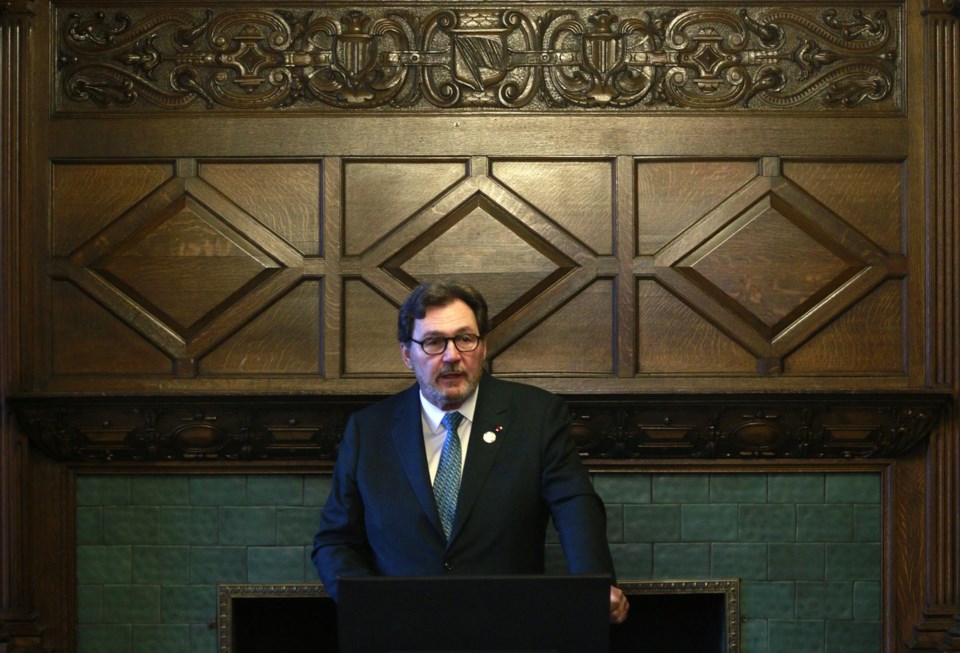VICTORIA — Canada's chief justice said he wanted to "bring the Supreme Court closer to Canadians" at a time of increasing misinformation, as he and other justices launched a cross-country tour to mark the court's 150th anniversary.
Chief Justice Richard Wagner and other justices of the Supreme Court of Canada were in Victoria on Monday for the start of the tour that will include four other cities.
He said the high court needed to do more now than it did 25 years ago to inform the public about what the court is doing and how its decisions affect the lives of Canadians.
The Supreme Court of Canada was established in 1875 and is the final court of appeal that has made groundbreaking decisions on topics such as abortion, marriage and medically assisted suicide.
"It's very difficult for people to have trust if they don't understand something or any institution," Wagner said in a news briefing at the Fairmont Empress hotel.
That is one reason the Supreme Court of Canada is increasing its efforts to inform the public what it does as well as how and why, he said.
"I think it will increase, improve, or maintain the trust of the people in our institution," Wagner said, adding there is more and more "misinformation and disinformation" circulating in the public due to social media.
The court's public proceedings let Canadians see how justice is done, ensures fairness and hold the court to the highest standards of independence and impartiality, he said.
"We publish plain-language summaries of our decisions, share information about our work on social media, and we support journalists in reporting on the court," Wagner said.
"We do all this to help Canadians better understand the law and the principles that guard our decisions. This is also why we are here in Victoria this week. We want to bring the Supreme Court closer to Canadians."
Three of the nine judges who sit on the high court are in Victoria, with Wagner being joined by Justice Nicholas Kasirer and Justice Andromache Karakatsanis.
"We often joke that it's like being in an arranged marriage with nine spouses," said Karakatsanis.
"We're together every day for every case. Sometimes we agree, sometimes we don't agree, and we have good, sometimes spirited discussions."
The collegiality that they have is important to collective decision making, she said.
"The dynamics are as you would expect when you've got nine independent, smart people who feel strongly about a case. We have a good debate and I enjoy working with my colleagues," Karakatsanis said.
Rebecca Johnson, a law professor at the University of Victoria and a former law clerk at the Supreme Court, said that though judges are appointed by governments with varying politics, the judiciary is neutral and focused on being transparent about difficult decisions.
"We have a judiciary that is so deeply engaged and answers the questions before them in ways that mean, even if you disagree with the outcome that they come to, we have a society in which we can talk about the reasons why they've come to those decisions at any given point, and it's not driven by politics," Johnson said.
"It's a strange time to be looking across the border and seeing very different conversations, ones that are less, sort of, equality enhancing and a little bit more fearful and a little bit more exclusionary."
Adam Hofri, an associate professor at the Peter A. Allard school of law at the University of British Columbia, called the Supreme Court of Canada one of the world's leading apex courts.
"Especially impressive is the body of jurisprudence, interpreting, enlarging and applying the Constitution Act of 1867 and the Charter of Rights of 1982," Hofri said in a phone interview.
It has occasionally interpreted the provisions of the Constitution Act and the Charter in ways that could be called "activist," such as allocating power or additional power to the court, he said.
"Some people don't like this and believe courts should only have those powers expressly allocated to them by the text of basic constitutional documents such as the Constitution Act and the Charter of Rights," Hofri said.
However, the Supreme Court has been a major player in building up the protection and rights that Canadians enjoy. It also decides many cases on private, commercial and trust laws, he said.
The justices' two days in Victoria also include a public forum and they will meet students, professors, the legal community and First Nations.
The road show will be in Moncton, N.B., on March 10 and 11. Later in the year, they will visit Yellowknife, Sherbrooke, Que. and Thunder Bay, Ont.
The court is holding several activities throughout the year that encourage public involvement. In April, it will host a bilingual symposium to examine how the court's role can evolve.
"Trust is essential in a democracy. It must be earned and maintained through openness and transparency," Wagner said.
This report by The Canadian Press was first published Feb. 3, 2025.
Marcy Nicholson, The Canadian Press




